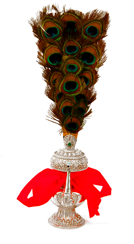頁面 "Mendrup" 與 "Pumba 寶瓶" 間的差異
SSTC Serena(對話 | 貢獻) (SSTC Serena 已移動頁面 Mendrup 至 Mendrup 甘露丸) |
SSTC Serena(對話 | 貢獻) |
||
| 行 1: | 行 1: | ||
| − | + | [[Image:Pumba.png|frame|'''pumba''']]'''Pumba''' ([[Wyl.]] ''bum pa''; Skt. ''kalaśa'') — a sacred water vase used for ritual practices and [[empowerment|initiations]]. | |
| + | |||
| + | Although identical in appearance, there are two kinds of water vases: the ‘chief’ or ‘main vase’, or ''tso bum'', and the ‘activity’ or ‘working vase’, the ''lé bum''. The main vase is the support for the visualization of the [[mandala]] of deities. The activity vase is used for water purification during the different stages of the ritual. In the [[Khandro Nyingtik|new Nyingtik]] tradition, the main vase is placed at the centre of the mandala house or shrine for ceremonies such as empowerment. The activity vase, used by the [[chöpön]], is usually placed on the vajra master’s table. | ||
| + | |||
| + | A white, blue, yellow, red or green silk ribbon is tied around the neck of the vase, to accord with the [[five buddha families|Buddha family]] lineage to which the main [[yidam]] deity of that mandala is assigned. | ||
| + | |||
| + | Also see [[twenty-five ingredients of the pumba]]. | ||
| + | |||
| + | [[Category: Shrine and Ritual]] | ||
於 2020年11月7日 (六) 15:41 的最新修訂
Pumba (Wyl. bum pa; Skt. kalaśa) — a sacred water vase used for ritual practices and initiations.
Although identical in appearance, there are two kinds of water vases: the ‘chief’ or ‘main vase’, or tso bum, and the ‘activity’ or ‘working vase’, the lé bum. The main vase is the support for the visualization of the mandala of deities. The activity vase is used for water purification during the different stages of the ritual. In the new Nyingtik tradition, the main vase is placed at the centre of the mandala house or shrine for ceremonies such as empowerment. The activity vase, used by the chöpön, is usually placed on the vajra master’s table.
A white, blue, yellow, red or green silk ribbon is tied around the neck of the vase, to accord with the Buddha family lineage to which the main yidam deity of that mandala is assigned.
Also see twenty-five ingredients of the pumba.
